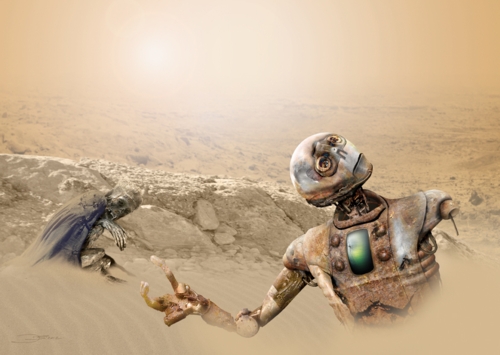Interzone 244 Jan - Feb 2013 (12 page)
Read Interzone 244 Jan - Feb 2013 Online
Authors: TTA Press
Tags: #short fiction, #fantasy, #short stories, #science fiction, #sf, #artwork, #reviews, #short fantasy, #interviews, #eric brown, #lavie tidhar, #new authors, #saladin ahmed, #movie reviews, #dvd reviews, #margaret atwood, #tony lee, #jim burns, #jim hawkins, #david langford, #nick lowe, #jim steel, #tracie welser, #ann vandermeer, #george zebrowski, #guy haley, #helen jackson, #karin tidbeck, #ramez naam

And avenge how many worlds?
The world is full of rifle shops.
We were all dead once, “he” told me, so it
cannot matter how many “I” kill as we devastate the planet and
dream of infesting distant suns.
* * * * *
Copyright © 2013 George Zebrowski
* * * * *
George Zebrowski’s
Brute
Orbits
won the John W. Campbell Award for best novel, and
Cave of Stars
(a companion to his classic
Macrolife
)
was chosen for
Science Fiction, The 101 Best SF Novels
1985–2010
. Three of his short stories, including ‘The Eichmann
Variations’ (1984), have been nominated for the Nebula Award, and
‘The Idea Trap’ was nominated for the Theodore Sturgeon Award. His
latest novel is
Empties
(Golden Gryphon Press/SF Gateway).
With Gregory Benford he co-edited
Sentinels In Honor of Arthur
C. Clarke
(Hadley Rille Books).
Decimated
, ten
collaborations with Jack Dann (Borgo Press/Wildside) has just been
published.
* * * * *
by Guy Haley
Illustrations for
iRobot
by Jim
Burns

iROBOT
There is nothing but the desert, a
landscape of dust and ceaseless wind.
Dunes of dust creep
across the land, dust sheets from their scimitar peaks. Ribbons of
dust undulate swiftly up and down their sides. The dust makes the
sky brown, the rising sun pale and dirty. Shrouds of dust chase
each other through the air, tangling daylight in their umber
strands. The sun retaliates, flaring a little brighter, calling
shadows from the desert; hard and straight, traces of something
beneath the sand.
There was a city here once.
Wind blows harder. Brick and worn concrete
rise from the desert, grains of dust carried from them in torrents.
The walls have lost their edges, worn smooth by the scouring sands.
They are as cracked as ancient teeth, and yet in procession, taken
from afar, unwavering. The lines and cells the walls describe are
echoes of lost angles and cast geometry, straight where the dust is
rippled and curled. In their simple precision the walls defy the
fractal whorls of the dust, although they cannot win the battle,
and have lost it many times before.
These are secret marks, conjured rarely when
the light is just so, legible only to archaeology. Their testimony
goes unread. There are no archaeologists any more.
Nor are there doctors, nor policemen. No
bums, no vendors, no consumers, no mothers or fathers or children,
no dogs or cats or bees or ants or trees. There is no one and
nothing at all; nothing but brown dust and the ruins they
suffocate, uncover, and suffocate again.
Something terrible happened here. When or
what, nobody knows, because there is nobody left to know. Only the
wind has a voice, but it says little; it does not care or
remember.
In the lee of a broken wall two figures are
revealed. One, huddled within the remains of long coat that flaps
in the freezing wind, was once a man. Desiccated black flesh, hard
as plastic, clings to yellow bones. Hair is still attached to his
shrivelled scalp. His eyes are raisins in his sockets. His mouth is
as wide as only the mouths of the dead can be, his tongue hard and
sharp inside his jaw. He lies on one arm. The other is flung out.
The bones of his fingers are outstretched toward the second figure,
as if in supplication, or in revelation; the hand of an apostle
reaching out to say “See! Here is the son of God”.
There are no gods now.
The second figure is not human. It is blocky
and broken and its torso is pitted by the actions of the elements.
Of its four limbs, one arm remains. Two of the fingers on the hand
of this arm have broken away. It remains cloaked to its waist in
the sand, coyly hiding the stumps of its legs. The wind pushes
grains of sand from globules of melted plastic and metal scattered
around the machine like dropped pearls. The ground they rest on is
fused to glass.
For much of the year the machine is hidden.
Summer storms periodically uncover the city, and then it and its
companion. Shifting ramparts build themselves up to the shattered
chestplate and fall away to the whim of the wind. The sports of
dust are relentless, and have no winner.
The robot still has a head, a cartoonish
facsimile of a human being. Its eyes are broken. Those parts of its
solar array that are whole are scrubbed opaque, as is the screen
upon its chest.
The machine has been dying a long time, but
it is not yet dead.
As the veiled sun strikes the machine,
something sparks inside. Images, as indistinct through the robot’s
ruined screen as the sun is indistinct in the ruined sky, flicker
and dance.
“
Good morning,” the robot’s
voice speaks. It does not matter in which language, it knows them
all in any case, and the speakers of languages are all dead and
gone from the Earth. “Good morning. I have four thousand and five
reminders!” Without preamble, it begins. Music, the choice of a
person whose dust is at one with all the other dust, crackles in
the background. “Parminder is 1,723 years old today!” The reminders
are the longest part of its liturgy, reminders of things that were
missed. Birthdays in the main, where cards were not sent. Others
are appointments never kept, and prompts to attend regular meetings
that ceased to be regular long ago. The machine recites them all
with equanimity. Its voice is faint but cheerful, although a buzz
mars it. At its sound the wind seems cowed, as if offended. The
recitation takes a long time. Finally, it is done.
“
Last twittles: Moshi
Horowitz is having palm-steamed yam for breakfast. Liam’s train is
late again, but he is enjoying a bacon sandwich. Melinda is very
tired, but last night was fun! Rodrigo Anamate says you must check
out this link. Link unavailable. No further messages. These
messages are 619,423 days old. Delete? Please repeat. Voice command
only. My touch screen is damaged. Please have me serviced at your
earliest convenience. I am not connected to the internet. Searching
for wifi connection.”
For a while the silence is given back to the
wind, to break or not as it chooses.
“
No wifi
detected.”
Silence again. The silence lasts the rest of
the day. Today is a bright day by the standards of the era, and at
times almost warm. The passage of time is uncertain. Noon is a blur
in a different part of the sky, afternoon a smear near the horizon.
Brown day makes way for grey dusk. Night comes swiftly. There are
no stars.
The glow from the robot’s screen is a lonely
light. The world retreats within it, becoming a square patch of
sand with sloping sides, framing a dead man’s outstretched hand.
His bones gleam like gold.
The robot is limited. It is programmed to
show concern, yet not to be intrusive. In its mind, flickering so
erratically now, a facsimile of compassion gives rise to a need to
reassure. “I am afraid I cannot answer your last queries,” it says.
“I am not equipped to make fire. I do not know how to make fire. I
do not know the location of water. I cannot make water. This
information is not available to me. I am not connected to the
internet. I am sorry.
“
You are quiet,” it says.
“Are you sad?”
Again the machine falls silent as its worn
brain searches for something to cheer this last master.
“
I have some amusing
footage of kittens, if you would like to see it.”
The night wears on. The machine’s solar
charge runs out, the light dies.
The wind tucks the city back in, into its
blankets of dust.
* * * * *
Copyright © 2013 Guy Haley
* * * * *
Guy Haley
lives in Somerset with his
wife Emma, young son Benny, a Malamute called Magnus, and an
enormous, evil-tempered Norwegian forest cat called, ironically,
Buddy. He has published novels with Angry Robot (the Richards &
Klein series) and Solaris (
Champion of Mars
). Visit him
online at [email protected].
* * * * *

* * * * *
by Jim Hawkins
Illustrations for
Sky Leap–Earth
Flame
by Richard Wagner

SKY LEAP–EARTH
FLAME
“
Why is sky blue,
Mariam?”
“I don’t know. Ask Victor.”
“Can you touch it, Mariam?”
The grass around
the tanks kept
itself a perfect green and at a perfect height of half an
inch.There were small hills, rocky outcrops, and sudden patches of
sand. Over to the east there was a lake that stretched beyond the
horizon, and sometimes she spotted a sailboat with white canvas
taut in the breeze.
Axon had given up asking her to walk on the
water out to the sailboats, but Axon loved it when Mariam stood
beside the lake and squeezed the warm mud between her toes. Or when
she stripped off and swam in the clear water, diving sometimes to
catch sight of a silver-green fish or the tentacles of an octopus
peeping out from a reef crevice.
There was no sensation – hot, cold, warm,
rough, slippery, prickly, or smooth – that Axon would not take in
and absorb. If Mariam cut herself, Axon was fascinated by the
bleeding, the scab, and the scars.
Mariam was twelve years old, with coal-black
hair, dark eyebrows and a slim, athletic body. She liked to keep
her hair tied back, but sometimes Axon wanted her to let it blow
around her face, and mostly she did, unless she was in a mood,
which was usually because Victor had told her she was stupid.
Usually she was forbidden to go near the
tanks, but today was Axon’s Layer Day and she was smart enough to
know that they didn’t want her there for the fun of it. She walked
down the slope over the perfect grass towards the white domes of
the tanks, her flip-flops smacking against her heels and the light
almost too bright to bear.
“
What will it be like,
Mariam?” asked the soft voice in her head.
“
I don’t know. I will be
with you.”
“
Will it hurt?”
“
I don’t know. If it hurts
you, it will hurt me.”
“
Are you
afraid?”
“
Who taught you
afraid?”
“
Victor.”
“
Is Victor
afraid?”
“
Yes.”
“
I’m not.”
“
Is there time for
swimming?”
“
No.”
“
That’s a
shame.”
“
Are you afraid,
Axon?”
“
I’m trying. I know it, but
I can’t feel it.”
The gate in the electric fence around the
tanks opened, and Mariam walked in, head high, but very scared. Her
twin, Victor, was already standing on the concourse beside the
nearest of the mushroom-like buildings, shading his eyes from the
intense light. Mariam was tanned and lithe. Victor was paler,
heavier, disliked physical activity, but they were still clearly
identical twins. Axon sometimes jokingly called them Exo and Endo –
she was a child of the wind and the waves, and Victor was a more
cerebral cave-dweller.
